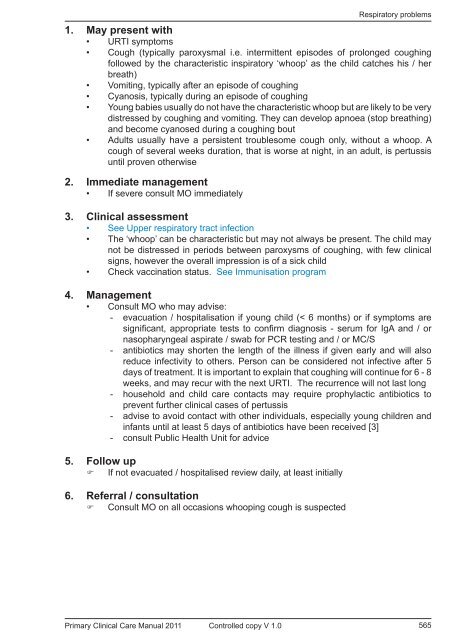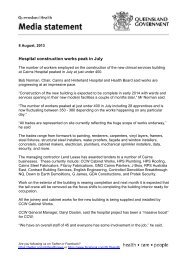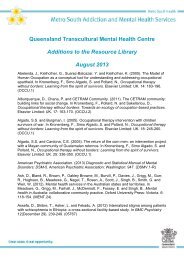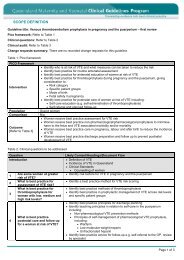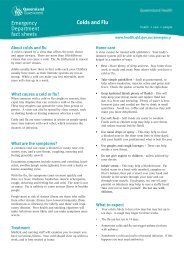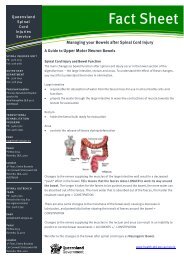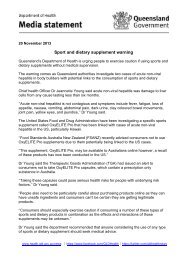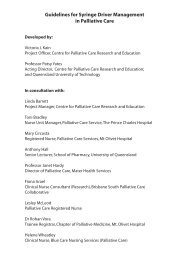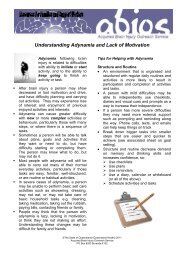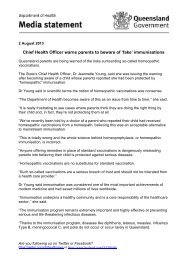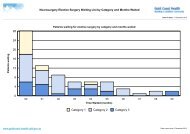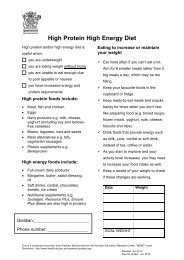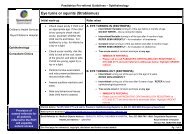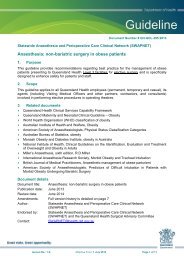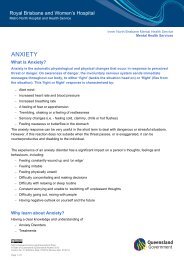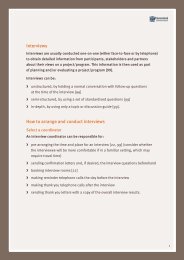Paediatrics - Queensland Health - Queensland Government
Paediatrics - Queensland Health - Queensland Government
Paediatrics - Queensland Health - Queensland Government
You also want an ePaper? Increase the reach of your titles
YUMPU automatically turns print PDFs into web optimized ePapers that Google loves.
Respiratory problems<br />
1. May present with<br />
• URTI symptoms<br />
• Cough (typically paroxysmal i.e. intermittent episodes of prolonged coughing<br />
followed by the characteristic inspiratory ‘whoop’ as the child catches his / her<br />
breath)<br />
• Vomiting, typically after an episode of coughing<br />
• Cyanosis, typically during an episode of coughing<br />
• Young babies usually do not have the characteristic whoop but are likely to be very<br />
distressed by coughing and vomiting. They can develop apnoea (stop breathing)<br />
and become cyanosed during a coughing bout<br />
• Adults usually have a persistent troublesome cough only, without a whoop. A<br />
cough of several weeks duration, that is worse at night, in an adult, is pertussis<br />
until proven otherwise<br />
2. Immediate management<br />
• If severe consult MO immediately<br />
3. Clinical assessment<br />
• See Upper respiratory tract infection<br />
• The ‘whoop’ can be characteristic but may not always be present. The child may<br />
not be distressed in periods between paroxysms of coughing, with few clinical<br />
signs, however the overall impression is of a sick child<br />
• Check vaccination status. See Immunisation program<br />
4. Management<br />
• Consult MO who may advise:<br />
-- evacuation / hospitalisation if young child (< 6 months) or if symptoms are<br />
significant, appropriate tests to confirm diagnosis - serum for IgA and / or<br />
nasopharyngeal aspirate / swab for PCR testing and / or MC/S<br />
-- antibiotics may shorten the length of the illness if given early and will also<br />
reduce infectivity to others. Person can be considered not infective after 5<br />
days of treatment. It is important to explain that coughing will continue for 6 - 8<br />
weeks, and may recur with the next URTI. The recurrence will not last long<br />
-- household and child care contacts may require prophylactic antibiotics to<br />
prevent further clinical cases of pertussis<br />
-- advise to avoid contact with other individuals, especially young children and<br />
infants until at least 5 days of antibiotics have been received [3]<br />
-- consult Public <strong>Health</strong> Unit for advice<br />
5. Follow up<br />
If not evacuated / hospitalised review daily, at least initially<br />
6. Referral / consultation<br />
Consult MO on all occasions whooping cough is suspected<br />
Primary Clinical Care Manual 2011 Controlled copy V 1.0 565


